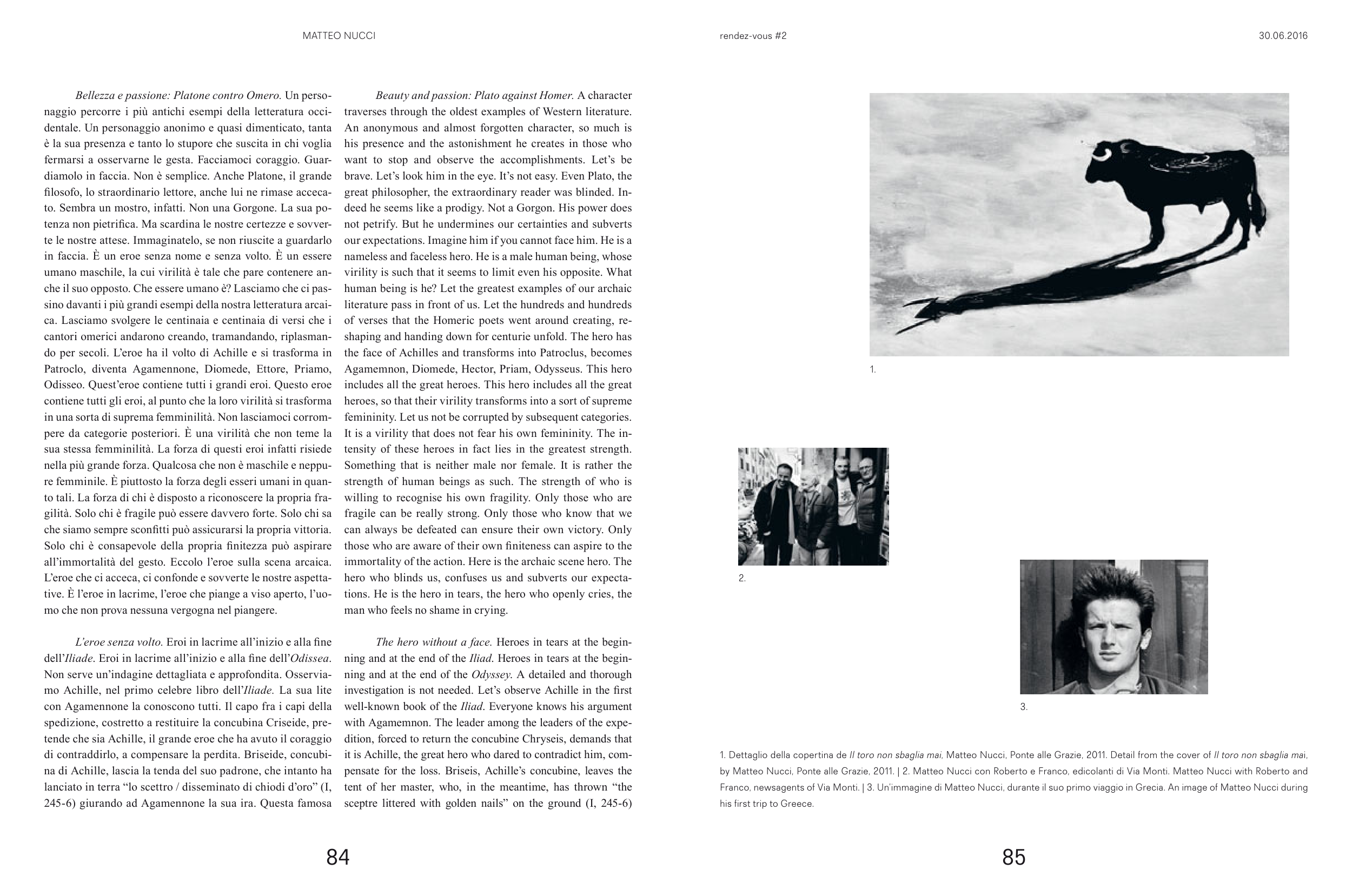84
85
Bellezza e passione: Platone contro Omero. Un perso-
naggio percorre i più antichi esempi della letteratura occi-
dentale. Un personaggio anonimo e quasi dimenticato, tanta
è la sua presenza e tanto lo stupore che suscita in chi voglia
fermarsi a osservarne le gesta. Facciamoci coraggio. Guar-
diamolo in faccia. Non è semplice. Anche Platone, il grande
fi losofo, lo straordinario lettore, anche lui ne rimase acceca-
to. Sembra un mostro, infatti. Non una Gorgone. La sua po-
tenza non pietrifi ca. Ma scardina le nostre certezze e sovver-
te le nostre attese. Immaginatelo, se non riuscite a guardarlo
in faccia. È un eroe senza nome e senza volto. È un essere
umano maschile, la cui virilità è tale che pare contenere an-
che il suo opposto. Che essere umano è? Lasciamo che ci pas-
sino davanti i più grandi esempi della nostra letteratura arcai-
ca. Lasciamo svolgere le centinaia e centinaia di versi che i
cantori omerici andarono creando, tramandando, riplasman-
do per secoli. L’eroe ha il volto di Achille e si trasforma in
Patroclo, diventa Agamennone, Diomede, Ettore, Priamo,
Odisseo. Quest’eroe contiene tutti i grandi eroi. Questo eroe
contiene tutti gli eroi, al punto che la loro virilità si trasforma
in una sorta di suprema femminilità. Non lasciamoci corrom-
pere da categorie posteriori. È una virilità che non teme la
sua stessa femminilità. La forza di questi eroi infatti risiede
nella più grande forza. Qualcosa che non è maschile e neppu-
re femminile. È piuttosto la forza degli esseri umani in quan-
to tali. La forza di chi è disposto a riconoscere la propria fra-
gilità. Solo chi è fragile può essere davvero forte. Solo chi sa
che siamo sempre sconfi tti può assicurarsi la propria vittoria.
Solo chi è consapevole della propria fi nitezza può aspirare
all’immortalità del gesto. Eccolo l’eroe sulla scena arcaica.
L’eroe che ci acceca, ci confonde e sovverte le nostre aspetta-
tive. È l’eroe in lacrime, l’eroe che piange a viso aperto, l’uo-
mo che non prova nessuna vergogna nel piangere.
L’eroe senza volto. Eroi in lacrime all’inizio e alla fi ne
dell’Iliade. Eroi in lacrime all’inizio e alla fi ne dell’Odissea.
Non serve un’indagine dettagliata e approfondita. Osservia-
mo Achille, nel primo celebre libro dell’Iliade. La sua lite
con Agamennone la conoscono tutti. Il capo fra i capi della
spedizione, costretto a restituire la concubina Criseide, pre-
tende che sia Achille, il grande eroe che ha avuto il coraggio
di contraddirlo, a compensare la perdita. Briseide, concubi-
na di Achille, lascia la tenda del suo padrone, che intanto ha
lanciato in terra “lo scettro / disseminato di chiodi d’oro” (I,
245-6) giurando ad Agamennone la sua ira. Questa famosa
Beauty and passion: Plato against Homer. A character
traverses through the oldest examples of Western literature.
An anonymous and almost forgotten character, so much is
his presence and the astonishment he creates in those who
want to stop and observe the accomplishments. Let’s be
brave. Let’s look him in the eye. It’s not easy. Even Plato, the
great philosopher, the extraordinary reader was blinded. In-
deed he seems like a prodigy. Not a Gorgon. His power does
not petrify. But he undermines our certainties and subverts
our expectations. Imagine him if you cannot face him. He is a
nameless and faceless hero. He is a male human being, whose
virility is such that it seems to limit even his opposite. What
human being is he? Let the greatest examples of our archaic
literature pass in front of us. Let the hundreds and hundreds
of verses that the Homeric poets went around creating, re-
shaping and handing down for centurie unfold. The hero has
the face of Achilles and transforms into Patroclus, becomes
Agamemnon, Diomede, Hector, Priam, Odysseus. This hero
includes all the great heroes. This hero includes all the great
heroes, so that their virility transforms into a sort of supreme
femininity. Let us not be corrupted by subsequent categories.
It is a virility that does not fear his own femininity. The in-
tensity of these heroes in fact lies in the greatest strength.
Something that is neither male nor female. It is rather the
strength of human beings as such. The strength of who is
willing to recognise his own fragility. Only those who are
fragile can be really strong. Only those who know that we
can always be defeated can ensure their own victory. Only
those who are aware of their own fi niteness can aspire to the
immortality of the action. Here is the archaic scene hero. The
hero who blinds us, confuses us and subverts our expecta-
tions. He is the hero in tears, the hero who openly cries, the
man who feels no shame in crying.
The hero without a face. Heroes in tears at the begin-
ning and at the end of the Iliad. Heroes in tears at the begin-
ning and at the end of the Odyssey. A detailed and thorough
investigation is not needed. Let’s observe Achille in the fi rst
well-known book of the Iliad. Everyone knows his argument
with Agamemnon. The leader among the leaders of the expe-
dition, forced to return the concubine Chryseis, demands that
it is Achille, the great hero who dared to contradict him, com-
pensate for the loss. Briseis, Achille’s concubine, leaves the
tent of her master, who, in the meantime, has thrown “the
sceptre littered with golden nails” on the ground (I, 245-6)
MATTEO NUCCI
1.
3.
2.
1. Dettaglio della copertina de Il toro non sbaglia mai, Matteo Nucci, Ponte alle Grazie, 2011. Detail from the cover of Il toro non sbaglia mai,
by Matteo Nucci, Ponte alle Grazie, 2011. | 2. Matteo Nucci con Roberto e Franco, edicolanti di Via Monti. Matteo Nucci with Roberto and
Franco, newsagents of Via Monti. | 3. Un’immagine di Matteo Nucci, durante il suo primo viaggio in Grecia. An image of Matteo Nucci during
his first trip to Greece.
30.06.2016
rendez-vous Δ2


